
Office of Innovation and Entrepreneurship


Office of Innovation and Entrepreneurship

Fiscal year 2024 was a transformative year for the growth of the innovation and entrepreneurship ecosystem, both at the University of Pittsburgh and in the region. This growth was led by the work of the four units that constitute the University’s Office of Innovation and Entrepreneurship (OIE).
Our mission is to help Pitt faculty and students and businesses in the region make a positive impact through their research and ideas. Over the past year, that unwavering drive directed our focus toward continuous improvement of established OIE programs, including the Chancellor’s Gap Fund to the School of Health and Rehabilitation Sciences Innovation Challenge operated by our Innovation Institute unit. Complementing established programs, OIE has sought to develop new pathways for innovators to have an impact through new programming and was pleased to announce the PittEI3 (Equitable, Inclusive, Innovation and Incubation) initiative during fiscal year 2024. This initiative is designed to bring more women and other historically excluded people into the innovation and entrepreneurship ecosystem at Pitt.
Continuing the theme of new opportunities to reach more innovators, this past year saw the launch of the ChangeMaker series at our Big Idea Center for student innovation and entrepreneurship. This new program is aimed at providing Pitt students interested in exploring the mindset and skill sets of innovation with the opportunity to earn a certificate through an immersive program open to all Pitt students, from first years to postdocs.
Our Institute for Entrepreneurial Excellence (IEE), meanwhile, continued to deliver vital consulting, mentoring, and networking services to the regional small business community and its membership base, including expanding its outreach to underrepresented and women entrepreneurs. Building on its legacy of dynamic programming, IEE launched a new series called Made to Last. The program is a no-cost education and networkbuilding series designed to help gig and maker businesses scale and grow. Additionally, IEE’s Entrepreneurial Fellows Class celebrated the graduation of its 25th cohort this past year.
Our Office of Industry and Economic Partnerships (OIEP) unit continues to align Pitt’s vast research capabilities with the needs of industry, creating mutually beneficial collaborations and providing channels for the commercialization of new technologies. OIEP focused on Pitt’s deep and life-changing research portfolio of technologies within gene therapy, oncology, diabetes, neurodegenerative disorders, and many other impactful technologies, in addition to the rest of the more than $1 billion in annual research expenditures at Pitt. This included meeting with more than 100 existing and potential new partners at the 2024 BIO International Convention in San Diego, California, in June.
As always, I would like to recognize the work of the OIE staff in all our units. Their dedication to developing new ways of working together and to delivering our services to Pitt innovators, students, regional businesses and industry, and government partners is unmatched and makes a world of difference.
Evan Facher
Vice Chancellor for Innovation and Entrepreneurship, University of Pittsburgh
Associate Dean for Commercial Translation, University of Pittsburgh School of Medicine




AHEAD Medicine’s Cyto-Copilot technology revolutionizes workforce efficiency and precision medicine by improving the efficiency, reproducibility, and scalability of flow cytometry analysis for research, clinical diagnostics, and cell therapy quality control.
Apik Bio Holding LLC is a biotechnology company that is focused on the development of novel therapies for solid tumors. The company’s technology allows precise targeting of cellular, radiation, and chemotherapies, thereby improving outcomes while reducing toxic effects.
Astria Biosciences, Inc., is a Pittsburgh-based startup company developing diagnostic and therapeutic solutions for cerebrovascular disease.
AxoCell Inc. develops nanofiber constructs for peripheral nerve repair that improve patient outcomes after peripheral nerve injuries by restoring feeling and functionality.
Monarch Therapeutics is proud to emerge as a leader in adoptive drug conjugates, developing transformative therapies for solid tumors. Monarch’s technology platform enables the rapid development of adaptor-CAR therapies that target multiple tumor antigens with a catalog of drug conjugates. Monarch’s lead program is a multi-target program directed to metastatic ovarian cancer.
Owl Therapeutics is a clinical-stage biopharmaceutical company created to develop bestin-class artificial intelligence and diagnostic-powered therapeutics for traumatic brain injury and brain health. The company has rapidly built a promising, diversified pipeline of small- and large-molecule medicines poised to address the highly unmet needs of patients with neurodegenerative disease.
Panther Life Sciences Corporation is unlocking the skin’s powerful immune properties to address a range of ailments (viral infections, cancer, allergies, autoimmune diseases, etc.) via shelf-stable treatments that are delivered directly to clinicians and patients around the globe.
Parent Heart Inc. provides resources, support, and community to families facing some of life’s toughest challenges. Parent Heart has developed range of programs and materials to support parents, grandparents, and other family leaders on their journeys as primary caregivers. In collaboration with University and community partners, our initiatives integrate the best of what we know from the science, from our history, and from each other to help families succeed despite whatever adversity may come our way.
Placenta AI, LLC is developing a machine learning approach to examine placenta tissue to determine whether women are at a health risk for future pregnancies.
Thendor Therapeutics is a biotechnology company with a mission to cure fibrosis.
ThirdLaw Molecular LLC has pioneered the development of Spiroligomer™ molecules and is developing this innovative, patent-protected therapeutic modality into a new class of more targeted medicines. The mission of the company is to create a revolutionary category of molecules that transform how diseases are diagnosed and treated— more safely and effectively.
Vanish Therapeutics Inc. is developing a bioresorbable nerve stimulator to treat acute and chronic pain.
Zegenex is working to transform wound care with its innovative healing devices and drugs.

In fiscal year 2024, the Pitt EI3 (Equitable, Inclusive, Innovation and Incubation) program was introduced to innovators at the University of Pittsburgh. The program targets inequality in academic innovation and ensures that the culture of innovation at Pitt fully includes historically excluded people.
The program is the brainchild of Cecelia Yates, an associate professor in the Pitt School of Nursing. When Yates was engaged in the research that eventually led to her cofounding a startup company, she found that, as a Black woman, she encountered few people who looked like her as she engaged in the innovation process.
Working with the Office of Innovation and Entrepreneurship, she built a coalition of partners across campus to bring the program to life, including the Office of the Senior Vice Chancellor for the Health Sciences, Office of the Senior Vice Chancellor for Research, Clinical and Translational Science Institute, and Office of the Provost.
“Innovation flourishes best when a diverse mix of talent, experience, and backgrounds is brought to the table. The Pitt EI3 program can invite new people and perspectives into the process and strengthen the culture of innovation and entrepreneurship that is gathering momentum across the University,” says Pitt Chancellor Joan Gabel. “There is impressive collaboration across campus that creates what can become the preeminent model for inclusive innovation across the national higher education landscape.”
The centerpiece of Pitt EI3 is a one-year fellowship for early to mid-career Pitt faculty members with research responsibilities. The 10 faculty members selected for the inaugural cohort will receive academic innovation and entrepreneurial skills training throughout their fellowship. Additionally, they will develop an individual academic innovation plan.
Jill Demirci is an associate professor in the Department of Health Promotion and Development at the School of Nursing. Demirci’s research program involves the development of innovative interventions and programs to support lactation/ breastfeeding.
James Huguley is an associate professor in the School of Social Work and chair of the Race and Youth Development Research Group at the Center on Race and Social Problems. His research focuses on school- and family-based interventions that promote positive developmental outcomes for Black youths in adverse and oppressive contexts.
Charles Jonassaint is an associate professor in the School of Medicine, where he is exploring novel technologies to expand the reach and impact of health care. He is the primary inventor of Painimation, a human-centered, technology-based approach for measuring pain.
Katrina Knight is an assistant professor in the Department of Bioengineering in the Swanson School of Engineering. Her research aims to improve the lives of women with pelvic floor disorders through the development of novel and innovative treatments while also increasing the number of underrepresented students pursuing an education and career in the fields of science, technology, engineering, and mathematics.
Lauren Kokai is an assistant professor in the Department of Plastic Surgery in the School of Medicine and codirector of the Adipose Stem Cell Research Center. One of her primary research goals is to enable the surgical repair of challenging ischemic wounds by treating hostile wound beds with simple, affordable, and effective therapeutic solutions that restore tissue health and function.
Christi Kolarcik is a research assistant professor in the School of Medicine’s Department of Pathology and the Swanson School’s Department of Bioengineering. Her research includes the development and testing of novel therapeutic approaches for the treatment of amyotrophic lateral sclerosis (ALS) and related neurodegenerative conditions.
Mangesh Kulkarni is a research assistant professor in the Swanson School’s Department of Bioengineering. He is an expert in cell/gene/mRNA delivery using tissue-engineered approaches. Coupled with his experience in multiomics-based discovery, he has pursued research spanning multiple applications, including diabetic wound healing, type 1 diabetes, corneal regeneration, abdominal wall repair, and inflammatory bowel disease.
Rebecca Price is an associate professor of psychiatry and psychology in the School of Medicine. Her research centers on the role of neurocognitive factors and neuroplasticity in the etiology, course, and treatment of depression, anxiety, compulsive behaviors, and suicidality. She is developing novel treatment strategies by coupling computer-based behavioral and biological interventions.
Andrele Brutus St. Val is an associate professor of legal writing at the School of Law. Her research interests include labor and employment law, law student resiliency, legal education pedagogy, and leveraging technology to provide effective online legal education.
Juan Taboas is an associate professor in the Department of Oral and Craniofacial Sciences in the School of Dental Medicine. His lab is working to commercialize a regenerative endodontic therapy for children, who he believes are an underserved population due to the often-higher regulatory burden for therapies targeted to children.
The University of Pittsburgh and UPMC Enterprises, through its Translational Sciences group, continue to collaborate to provide funding support for therapeutics projects that need further de-risking experiments to determine their clinical and commercial potential.
One of those projects is aimed at treating children with congenital muscular dystrophy, who carry a faulty gene that manifests as progressive muscle wasting and declining neuromuscular function.

The faulty gene, known as LAMA2, has more than 600 underlying mutations that have been identified in patients. Dwi Kemaladewi, an assistant professor of pediatrics in the Pitt School of Medicine, and her colleagues are up-regulating LAMA1, a sister gene to LAMA2. With this novel approach, they have shown that they can reverse the effects of LAMA2 mutations in animal- and patient-derived models using CRISPR gene editing activation.
Kemaladewi and her team initially focused on showing the efficacy of the therapy before the severe symptoms developed. In humans, however, diagnosis of muscular dystrophy does not usually occur until several months after birth. They now are investigating whether the LAMA1 therapy can help to reverse nerve and muscle damages that have already occurred.
That’s where funding support from UPMC Enterprises comes into the picture.
“With support from the UPMC Enterprises Translational Sciences group, we will be conducting experiments to mirror how a therapy would be used in patients,” Kemaladewi says.
“While we celebrate recent successes of gene therapy in the treatment of muscular dystrophy, more innovation in this space is clearly needed, both to support patients suffering from rarer genetic forms of muscular dystrophy such as LAMA2 congenital muscular dystrophy and to leverage emerging therapeutic technologies such as CRISPR activation” says Matthias Kleinz, executive vice president, translational sciences, at UPMC Enterprises. “We are thrilled to support the mission to positively impact this underserved pediatric patient community.”
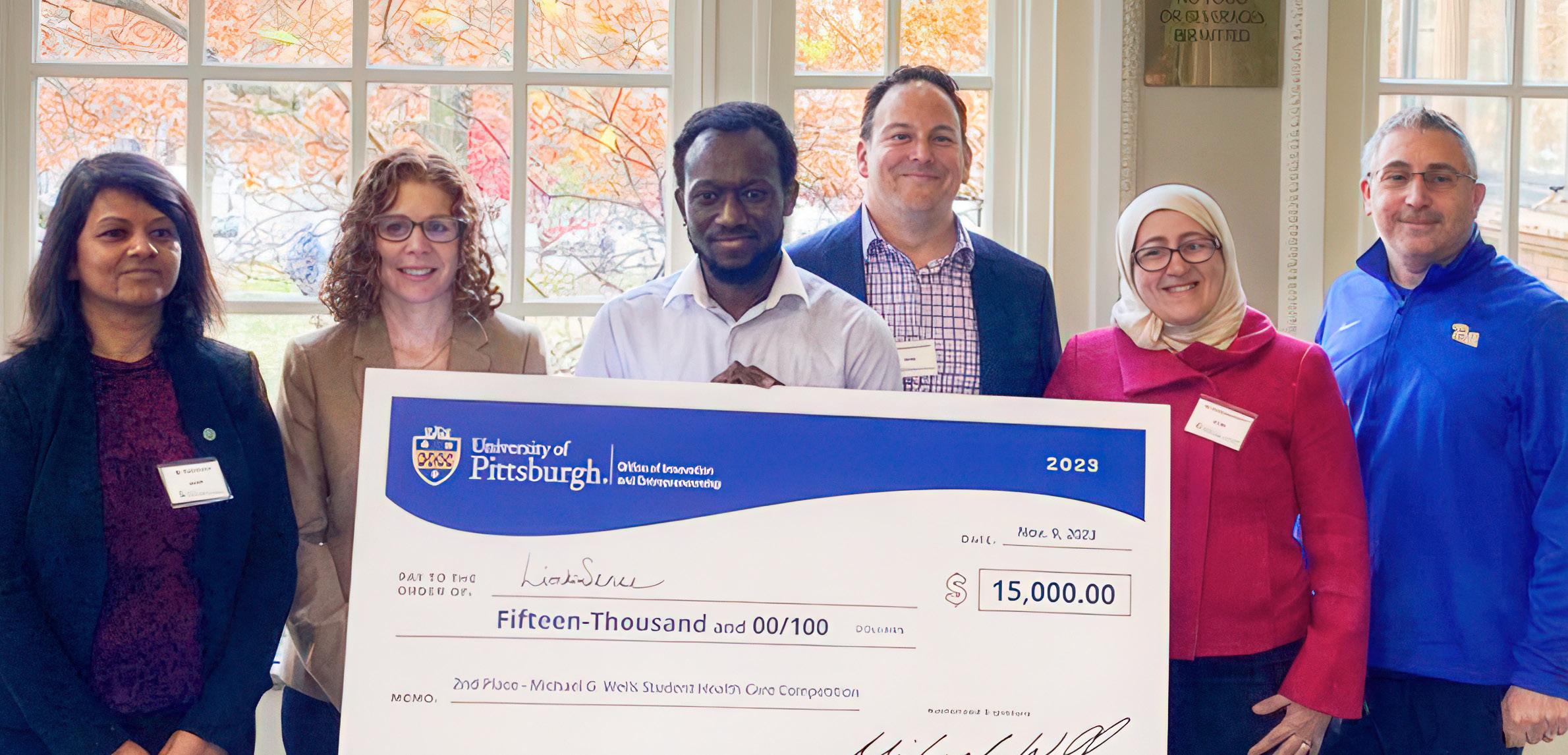
In its 13 years, the Michael G. Wells Student Healthcare Competition has had more than 80 student finalists. Teams in the Wells competition have gone on to form 20 startup companies and have raised nearly $30 million in additional funding from the University or private investors. Teams in the 2023 competition continued the tradition of extraordinary promise.
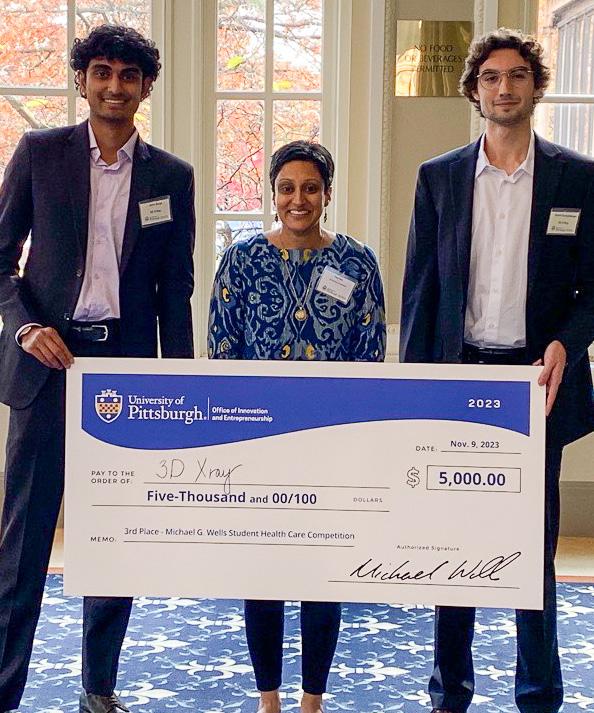
Capturing the $20,000 top prize were Shanae Butler and her team. Butler’s team, working with Asim Ejaz, an assistant professor in the Department of Plastic Surgery in the Pitt School of Medicine, focused on a system and process of keeping human skin discarded from plastic surgery procedures viable for extended periods so that it can be used as a platform for disease modeling, drug discovery, and cosmetics testing. Butler says that the Wells award will be used to develop software prototypes.
Earning $15,000 for second prize was Gilgal Ansah, a PhD student in the Rehab Neural Engineering Labs, where he has been working alongside associate professor Lee Fisher to develop LimbSense, an implant device system that helps people with leg amputations feel sensations of pressure and touch from prosthetic legs as though sensations were coming from their missing limb.
Receiving the third-place prize of $5,000 were Grant Kokenberger and Jatin Singh of team 3D X-Ray, one of two teams led by Pitt undergraduates.
Now in its fourth iteration, the School of Health and Rehabilitation Sciences (SHRS) Innovation Challenge awarded $100,000 in prizes to teams competing in the 2024 competition. Teams from SHRS with early stage discoveries presented their solutions for areas of innovation within rehabilitation science. Taking the top prizes this year were solutions for diagnosing dysphagia (difficulty swallowing); for entering and exiting a vehicle safely; and for a lightweight, customized, affordable wheelchair.
Each of the nine competing teams in the challenge participated in a National Science Foundation Innovation Corps short course designed to help them uncover the unmet needs their innovations could solve for potential users or customers.
“In our academic world, we spend a lot of effort in research generating knowledge. But it doesn’t have impact until people use it—when it’s translated into a product or service. That’s the ultimate success in our field. We’re trying to promote that ‘last mile’ from the lab to the market,” says David Brienza, SHRS associate dean for technology and innovation.
“One of the key things we teach is to take a scientific approach to business development. You have a hypothesis of the value that your innovation might provide, but how do you prove that? You go out and interview potential customers to see what is important to them,” says Paul Petrovich, assistant director of business development at the Innovation Institute, part of the Office of Innovation and Entrepreneurship, which coadministered the competition with SHRS.

Pitt researchers have developed a novel, noninvasive, sensor-based artificial intelligence method of detecting swallowing dysfunction.
Presenters: James Coyle, Erin Lucatorto, and Amanda Mahoney
Mentor: John McIntosh
Engineers from Pitt’s Human Engineering Research Laboratories have created a wheelchair from lasercut and bent sheet metal that increases the quality and customization of wheelchairs while lowering costs.
Presenters: Danielle Scott and Jessica Steinberg
Mentor: Lloyd Cooper
Pitt researchers have developed a vehicle seat overlay to facilitate safe transfer into and out of vehicles. The seat assists individuals with decreased strength, balance, or mobility.
Presenter: Julie Faieta
Mentor: Dan Seitam


The Chancellor’s Gap Fund provides opportunities for promising innovations discovered by University of Pittsburgh investigators to advance toward commercialization.
The program, administered by the Office of Innovation and Entrepreneurship, provides funding to achieve key technical/scientific milestones as well as business development support from the Innovation Institute’s New Ventures team and the Office of Industry and Economic Partnerships.
Chancellor’s Gap Fund awards can be used for a variety of precommercialization activities, including technology de-risking, prototype optimization, consulting support, and market assessment or validation, and provides financial support that cannot be obtained from traditional sources of funding, including government agencies, foundations, or an investigator’s department or school.

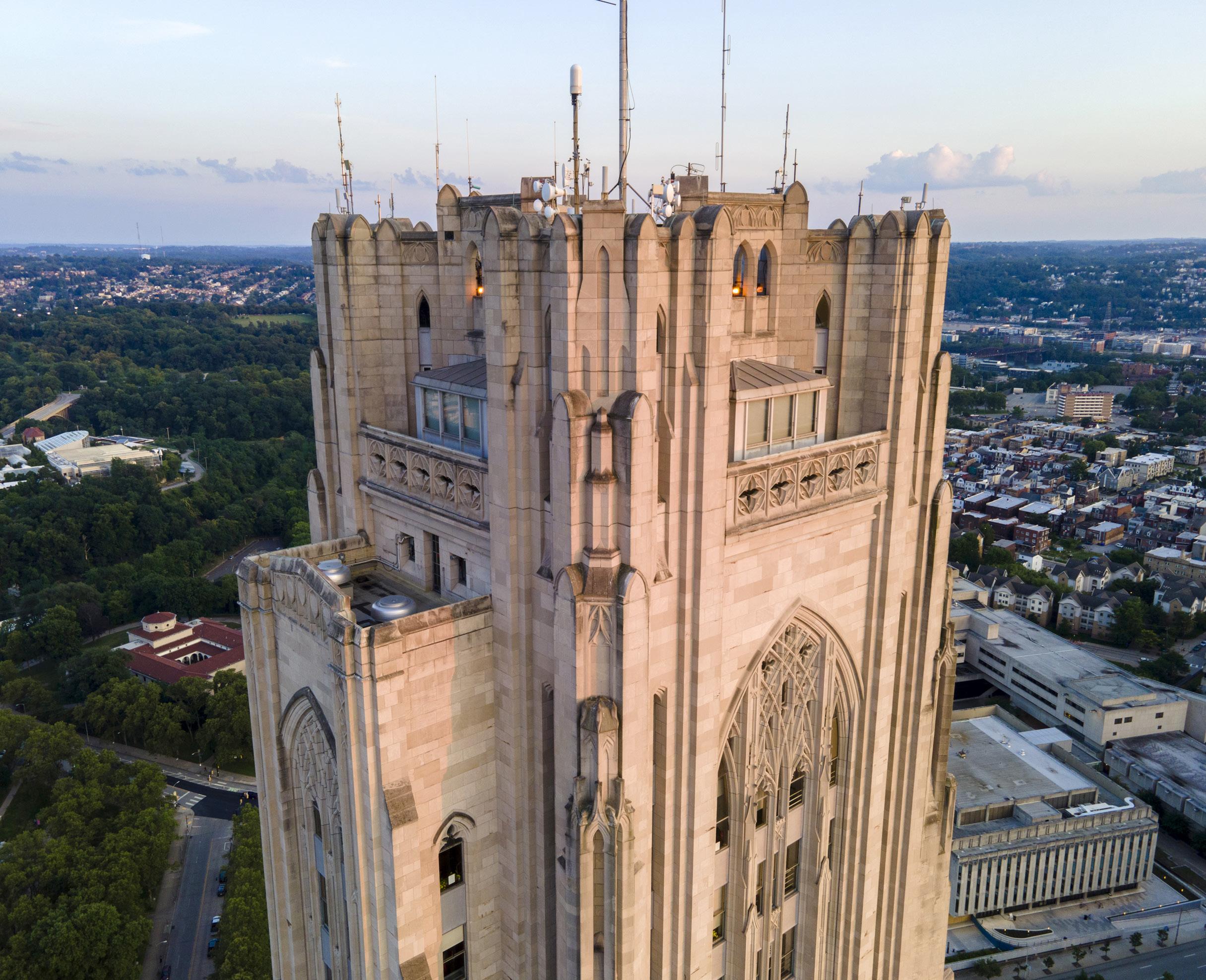

Principal Investigator:
Eric Goetzman , associate professor, Department of Pediatrics, School of Medicine
Pyruvate carboxylase deficiency is a rare genetic disease in which lactate in the blood rises to dangerous levels. Goetzman is developing a therapy around a special class of fatty acid that is rapidly metabolized to provide quick energy in many key tissues. Funding will be used to develop a mouse model and conduct preclinical testing.
Principal Investigator:
John Pacella , professor, Department of Medicine, School of Medicine
University of Pittsburgh researchers have developed a novel vascular stent with antiplatelet capabilities. By providing focal antiplatelet therapy, this ticagrelorcoated stent could revolutionize post-percutaneous coronary intervention (PCI) therapy by eliminating the need for blood-thinning drugs to prevent stent thrombosis, a serious post-PCI complication. The funding will be used to conduct in vivo preclinical studies.
Principal Investigators:
Eric Beckman , Distinguished Service Professor Emeritus, Department of Chemical and Petroleum Engineering, Swanson School
Susan Fullerton , associate professor, Department of Chemical and Petroleum Engineering, Swanson School
Tens of millions of tons of synthetic polymers enter the world’s oceans each year and are transformed into microplastics that are consumed by sea creatures and, eventually, people. The team created prototype thin films that degrade into benign components in salt water that could replace nondegradable plastics and reduce microplastic pollution. Funding will be used to further develop this prototype to decrease water permeation to meet standards for applications in the packaging industry.
Principal Investigators:
Kayhan Batmanghelich , assistant professor, Department of Electrical and Computer Engineering, Swanson School of Engineering
Amir Mina , doctoral student, Medical Scientist Training Program, School of Medicine
The team is applying machine learning algorithms to EEG data collected during surgery to develop models for detecting ischemia and stroke during cardiovascular surgery in real time, allowing for appropriate interventions. Funding will be used to conduct a pilot study and develop the regulatory preparation required for the U.S. Food and Drug Administration approval process.
Parthasarathy Thirumala , professor, Department of Neurology, School of Medicine
Shyam Visweswaran , professor, Department of Biomedical Informatics, School of Medicine
The University of Pittsburgh once again had faculty members selected to join the National Academy of Inventors (NAI) within the last year. José-Alain Sahel and Prashant N. Kumta were elected fellows of the National Academy of Inventors. Sahel and Kumta are the 13th and 14th Pitt faculty members to be named NAI fellows since 2014. The NAI fellows program highlights academic inventors who have demonstrated a spirit of innovation in creating or facilitating outstanding inventions, making a tangible impact on the quality of life, economic development, and the welfare of society.

Sahel, Distinguished Professor in and chair of the Department of Ophthalmology at the University of Pittsburgh School of Medicine and the Eye and Ear Foundation Endowed Chair, is a global trailblazer in vision restoration research. Sahel has been prolific in developing and licensing intellectual property. He is a coinventor on more than 40 patents worldwide, many of which have been licensed to startup companies, including Fovea Pharmaceuticals, which was later acquired by Sanofi. Others include GenSight Biologics, Pixium Vision, Tilak Healthcare, Chronolife, Prophesee.ai, and SparingVision.
Kumta , Distinguished Professor of Bioengineering and Edward R. Weidlein Chair Professor in the Swanson School of Engineering, is a pioneer in a breathtaking array of research fields. Kumta’s work in nanomaterials has resulted in innovations across fields as varied as energy storage, tissue engineering, and biomaterials. Kumta has been issued 42 patents for his innovations, which have been licensed to numerous companies, including Changs Ascending Enterprise Co., Ltd.; Biobone LLC; Formabone Inc.; InCube Labs; the National Energy Technology Laboratory; and Flexcellz Inc.

Additional recognition came to Pitt faculty from the National Academy of Inventors (NAI) this year. Assistant Professor of Ophthalmology Leah Byrne and Associate Professor of Immunology Greg M. Delgoffe were both named senior members. Byrne and Delgoffe are pioneering research and commercialization of cell and gene therapies to restore vision and treat cancer, respectively.
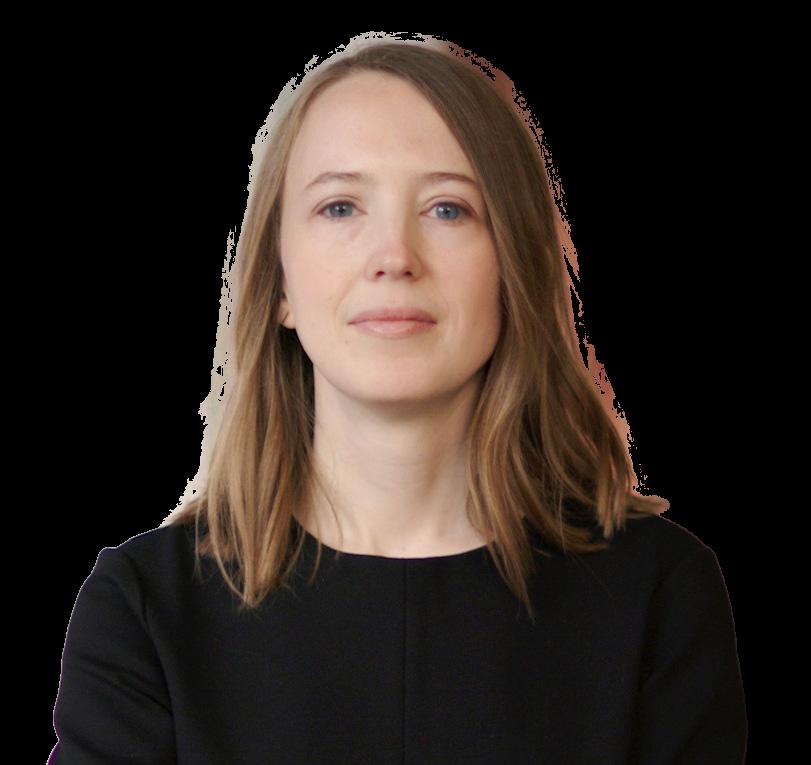
Byrne’s lab is doing groundbreaking work in gene therapy for rare inherited retinal degenerative diseases that result in blindness. Her lab develops viral vectors with new abilities to deliver therapeutic genes to the retina that allow for increased precision of gene delivery and protein expression. Byrne has been prolific in her development of new intellectual property. In a career spanning just a little more than a decade, she already has been issued 12 patents for her work, with many more in prosecution.

Delgoffe’s lab studies the intersection of metabolism and immunity in cancer. Specifically, his research team examines how tumor cells deplete their local microenvironment of nutrients, starving tumorinfiltrating T cells and preventing their function. His research leverages both repurposed metabolic drugs and novel synthetic biology approaches to tip this metabolic balance in favor of the tumor-killing immune response. Additionally, Delgoffe cofounded a startup company, Novasenta, which has raised $60 million since its founding in 2018 and is working toward moving at least one of its therapeutic programs into the clinic in 2024.
NAI senior members are active faculty, scientists, and administrators from NAI member institutions who have demonstrated remarkable innovation in producing technologies that have brought, or aspire to bring, real impact on the welfare of society.
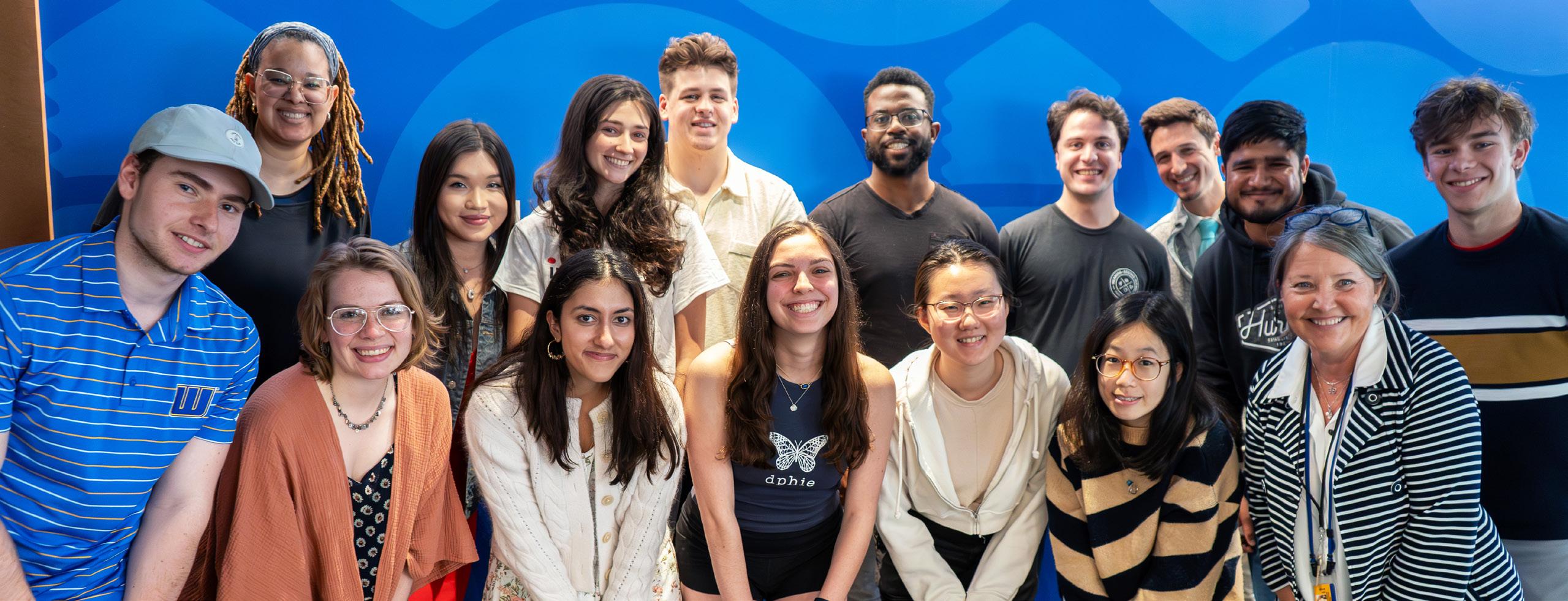
The Big Idea Center, Pitt’s hub for student innovation and entrepreneurship, achieves approximately 1,500 student engagements through its programming each year. While this has been impressive, the center has been exploring opportunities to engage a larger percentage of Pitt students. Through customer discovery work, the center found that, in general, students who did not engage either felt that entrepreneurship was not for them or that they did not have their own idea to pursue. Yet a recent survey of center participants who engaged in any type of innovation and entrepreneurial programming over the past nine years found that 93% of respondents draw on their experiences daily or their experiences were a positive, life-changing impact.
Inspired by these insights and further exploratory conversations with students, the Big Idea Center began developing a new out-of-classroom immersive innovation and entrepreneurial certificate of recognition program aimed at giving all Pitt students the same opportunity for building the innovative and entrepreneurial mindset, skill sets, and experiences that can provide the same impact as a traditional classroom experience would on their lives and careers. This new program, the ChangeMaker Scholar Program, will fully launch in the 2024 fall term.
More about the ChangeMaker Scholar Program can be found at bigidea.pitt.edu/programs/bic-changemaker.
In spring 2024, the Big Idea Center tested students’ desirability for such a new program when it piloted its ChangeMaker Series, a five-session body-ofknowledge master class program designed for Pitt students interested in exploring innovation and entrepreneurial concepts and what change making in action and its impact look like across various disciplines, professions, and areas of interest. The sessions, which will be offered each fall and spring term going forward, are designed to introduce key concepts and disciplines of innovation and entrepreneurship and are brought to life by experienced guest speakers.
While the center expected to have just a handful of students participate in the series pilot, a diverse group of more than 30 students across multiple disciplines and levels applied. A total of 26 participated, with 17 completing the full series and earning a certificate of completion, fulfilling the eligibility requirement for acceptance into the full ChangeMaker Scholars Program. This level of participation in the initial pilot demonstrates a strong demand for innovation and entrepreneurship knowledge building across all student levels and disciplines as well as a desire to explore how the skill sets and mindsets of innovators and entrepreneurs can be applied to and impact their own lives and careers.



In its third year with the Big Idea Center, the Kuzneski Innovation Cup, an early stage idea competition sponsored by Andy and Laurie Kuzneski, saw a record number of student teams applying to the competition in 2023.
After working for several weeks with Big Idea Center entrepreneurs in residence, 13 teams were invited to present their ideas to the Kuzneskis and their panel of guest judges, with six ultimately receiving a portion of the $25,000 prize pool.
Shanae Butler and Tolani Akinrinoye
A product specifically formulated for improving gut health among Black women by addressing distinct characteristics of gut bacteria.
($8,500)
Jack Pearson, Joe Pearson, and Zack Yardley
An online platform to calculate one’s carbon footprint and connect with impactful services to reduce one’s emissions that quantifies one’s personal environmental impact and provides solutions through quality reforestation projects, carbon credits, and simple habitual changes to empower each person to reach net zero.
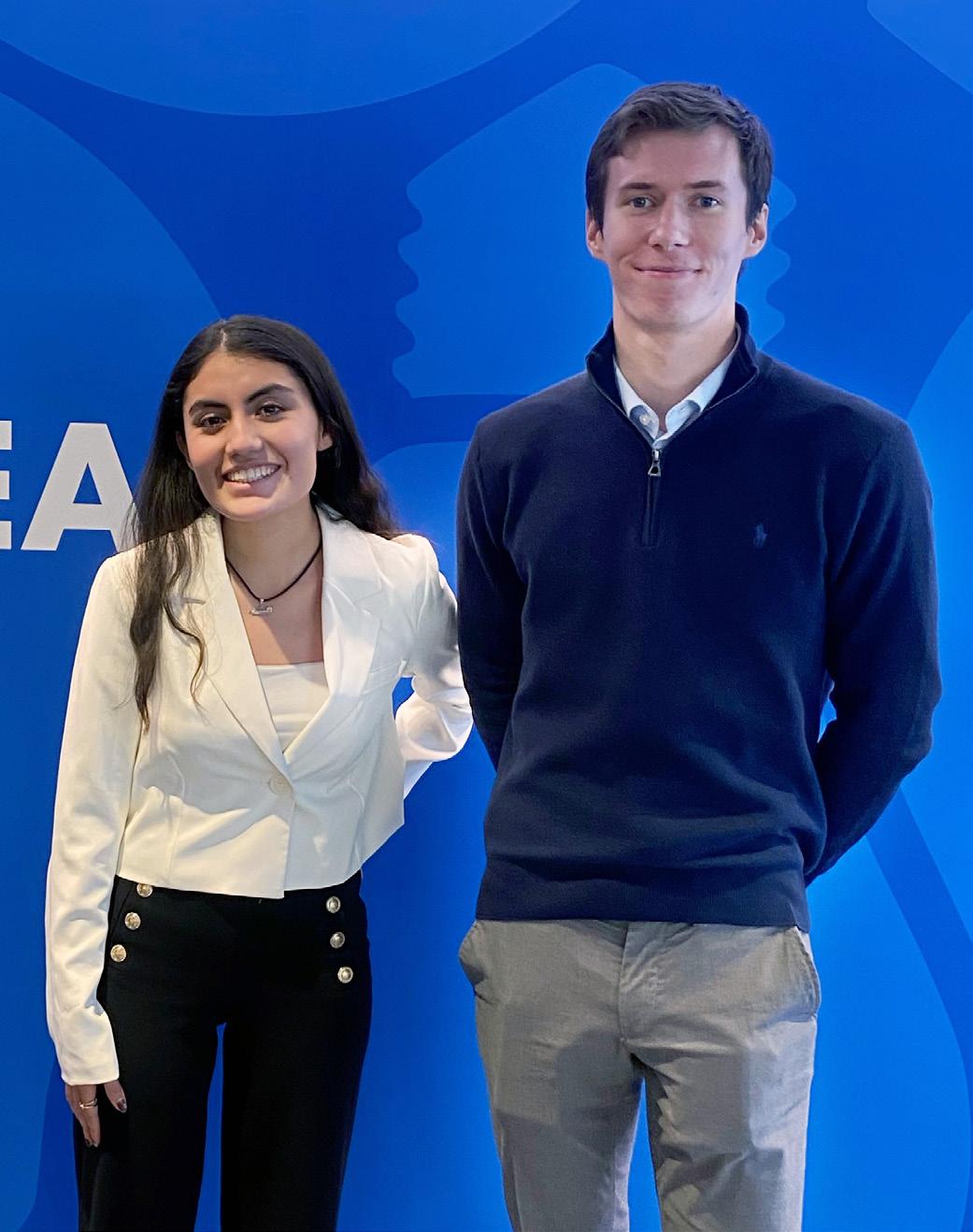
Ian Chang and Hannah Ye
A specialty vending machine that can dispense hot meals in seconds.
Ashley Ajuz, Jordan During, and Dhinar Gayatri
An all-in-one electronics tool kit designed for students and innovators to make learning about electrical and computer engineering (ECE) topics easier through an app that has features to simplify projects in ways that currently are not on the market
Ben Leslie (ENGR’24)
A novel surgical instrument that combines suction and retraction tools into one device while maintaining the retractor’s malleable and bendable properties, an innovation that increases both surgeon efficiency and effectiveness by reducing surgical duration and risks to patients, all while saving hospitals millions of dollars annually.
Natasha Mody (ENGR ’24) and Aqsa Owais
An accessible, preventative dental care solution that leverages machine learning technology to identify potential dental issues early on, both promoting proactive oral health practices and reducing the risk of more serious dental problems in the future.
In its 16th year, the 2024 Big Idea Competition was the most rigorous yet. What originated as the only opportunity for Pitt students to experience innovation and entrepreneurship has become the Big Idea Center’s signature competition for student-led teams committed to turning an idea into reality.
Thirty teams, composed of students from first years to postdocs, applied to the 2024 competition. They brought in their big ideas ranging from blood diagnostics and medical and surgical devices to environmental and social impact challenges, new technology for music education, and more.
After a judged application review, 24 teams competed in the semifinal pitch round, with 17 of these teams moving on to the competition’s final round. Over the following two months, these teams engaged with alumni, industry professionals, mentors, coaches, and subject matter experts to continue refining and strengthening their big ideas and hone their pitches. Teams then pitched to a panel of expert judges at the final presentation round in early April.
The top teams demonstrated that their work with the Big Idea Center, through various programs, helped to advance and strengthen their ideas to propel them to the top of the podium.
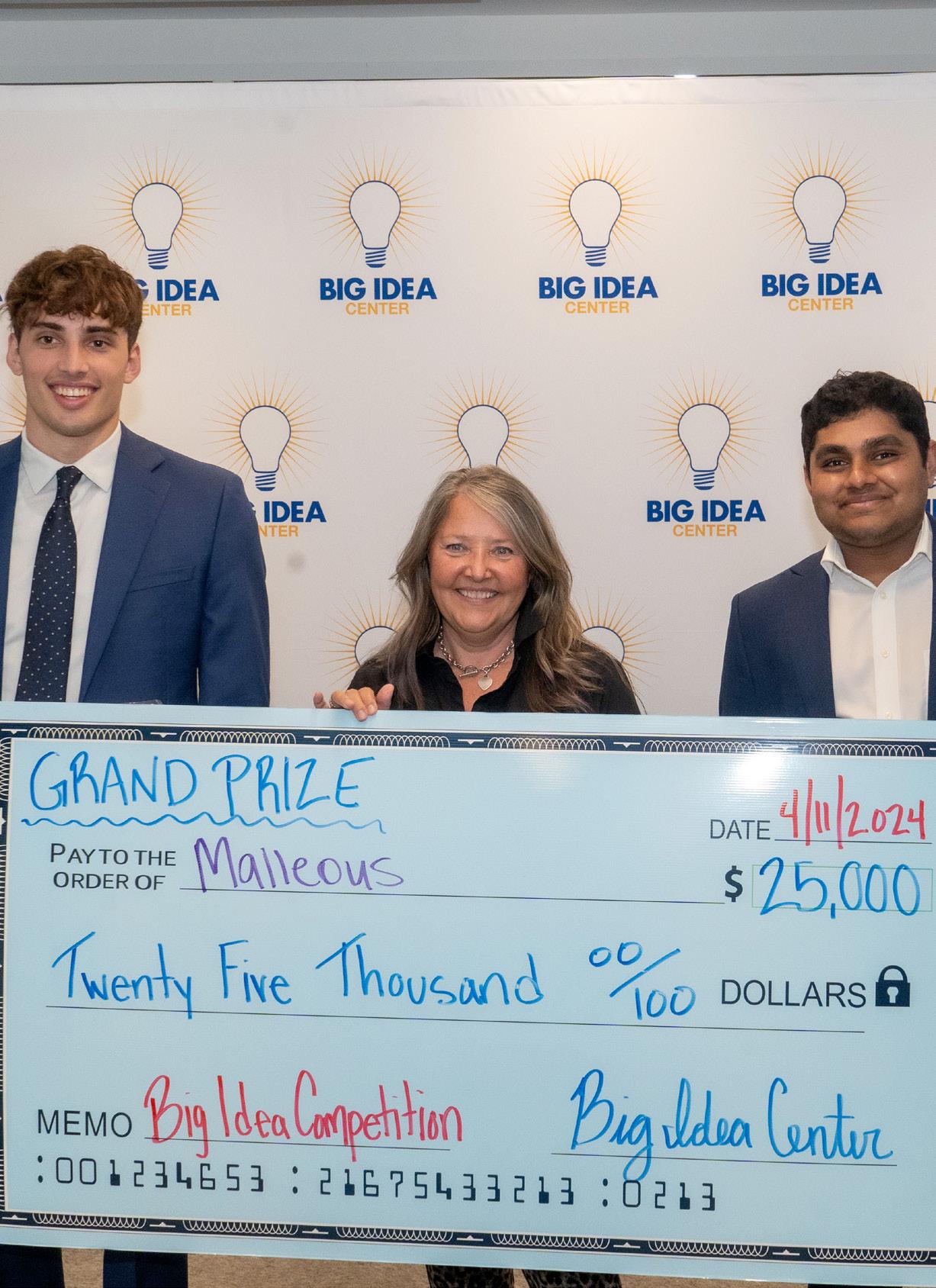
($25,000)
MALLEOUS
Ben Leslie (ENGR ’24) and Rohit Mantena
A novel surgical instrument that combines suction and retraction tools into one device while maintaining the retractor’s malleable and bendable properties, this innovation increases both surgeon efficiency and effectiveness by reducing surgical duration and risks to patients, all while saving. hospitals millions of dollars annually.
($15,000 EACH)
Julia Aapfelbacher (MED ’24) and Joe Maggiore
A music education software tool designed to provide a new way to get kids excited about music class while allowing schools to stay under budget and meet learning objectives, Conduction allows students to easily compose original songs, then see their compositions come to life by real musicians.
Andrew Daoud (ENGR ’24), Sejeal Katiyar (ENGR ’24), Sam Lord (ENGR ’24), Garrett Martin (ENGR ’23), Tanvi Mittal (Carnegie Mellon University) and Amogh Vellore
A neurosurgery-targeted device that aims to improve patient outcomes and reduce surgical time by condensing bulky essential surgical tools into a single augmented reality headset.
Andrew Liu (A&S ’23) and Shruthi Venkatesh (A&S ’19)
StemPath created a comprehensive artificial intelligence (AI) assisted recruiting platform for STEM talent. By integrating the entire STEM recruiting pipeline, both candidates and hiring managers are empowered to make the best career match.
Diya Qu (BUS ’24G), Qi Chen (SCI MS ’24), Binda Li (Carnegie Mellon), and Xinyu Wan (Carnegie Mellon)
MitoAI created a fully automated cell culture process that leverages AI for decision making and robotics for liquid handling, integrating incubation, imaging, and liquid transfer of cell cultures into a single system. Ultimately, MitoAI’s solution significantly reduces human labor and costs and enhances the efficiency and quality of cell culture.
Jack Pearson and Joe Pearson
An online platform to calculate one’s carbon footprint and connect with impactful services to reduce one’s emissions, Forevergreen quantifies one’s personal environmental impact and provides solutions through quality reforestation projects, carbon credits, and simple habitual changes to empower each person to reach net zero.
Bavya Mavila Chathoth, C.J. Belleci, and Sara Trbojevic
DetectION’s cost-effective, portable solution provides timely detection of sodium and potassium levels through a simple capillary blood prick, eliminating the need for specialized expertise. With its innovative technology and smart features, DetectION is poised to revolutionize electrolyte detection in critical care, ambulances, and resource-limited settings, making it an indispensable tool for swift intervention and improved patient outcomes.
Avi Moses (CBA ’24), Tyler Fritz, Vy Nguyen (SCI ’23), Matthew Fraijo, and Silian Lihuang (SCI ’24)
A friend-making platform for young professionals to solve the problem of feeling isolated in their city through weekly community events and interest-based groups.
Hanzala Rehan (SCI ’24), Jared Peters (SCI ’24), Kian Salem, and Jack Mezger
An automated compliance testing solution to reduce bias and ensure fair practices in the lending industry, this platform streamlines the compliance process by enabling lenders to quickly assess their adherence to fair lending standards. Plyance reduces time and costs while promoting ethical lending practices that support underserved communities.

In its second year partnering with the Penn Hills Charter School of Entrepreneurship (PHCSE), the Big Idea Center continued to provide PHCSE students with opportunities to be inspired by Pitt student innovators and entrepreneurs throughout the year.
In spring 2024, representatives from the Big Idea Center spoke at the 30th Annual MicroSociety Conference, hosted at PHCSE, about the partnership that has greatly impacted K-8 and college students alike and to inspire other educators from across the nation to think about how they can implement collegiate partnerships within their schools.
This year, educators from across the country who attended the conference witnessed this partnership in action as Becca Segel, founder of FlowCellutions, LLC, and Utkars Jain, cofounder of HEARTio, shared stories with a lively audience of first through fourth graders about their entrepreneurial journeys.
Furthermore, conference attendees witnessed how such partnerships lead to unexpected wins for both the school, its students, and Pitt student innovators. Last year, Joe Maggiore, Pitt MSTP student, shared his experience creating Conduction, a music technology business that blends digital music composition with live performers in real time. PHSCE administrators and teachers were so inspired by the technology that they worked with Maggiore to integrate Conduction into their music program. This year, Maggiore facilitated a session at the conference in which the PHCSE elementary students who had been learning and using the Conduction software spoke about, demonstrated, and then taught conference attendees how to use it to compose unique musical pieces followed by a live performance of the compositions they had just created.
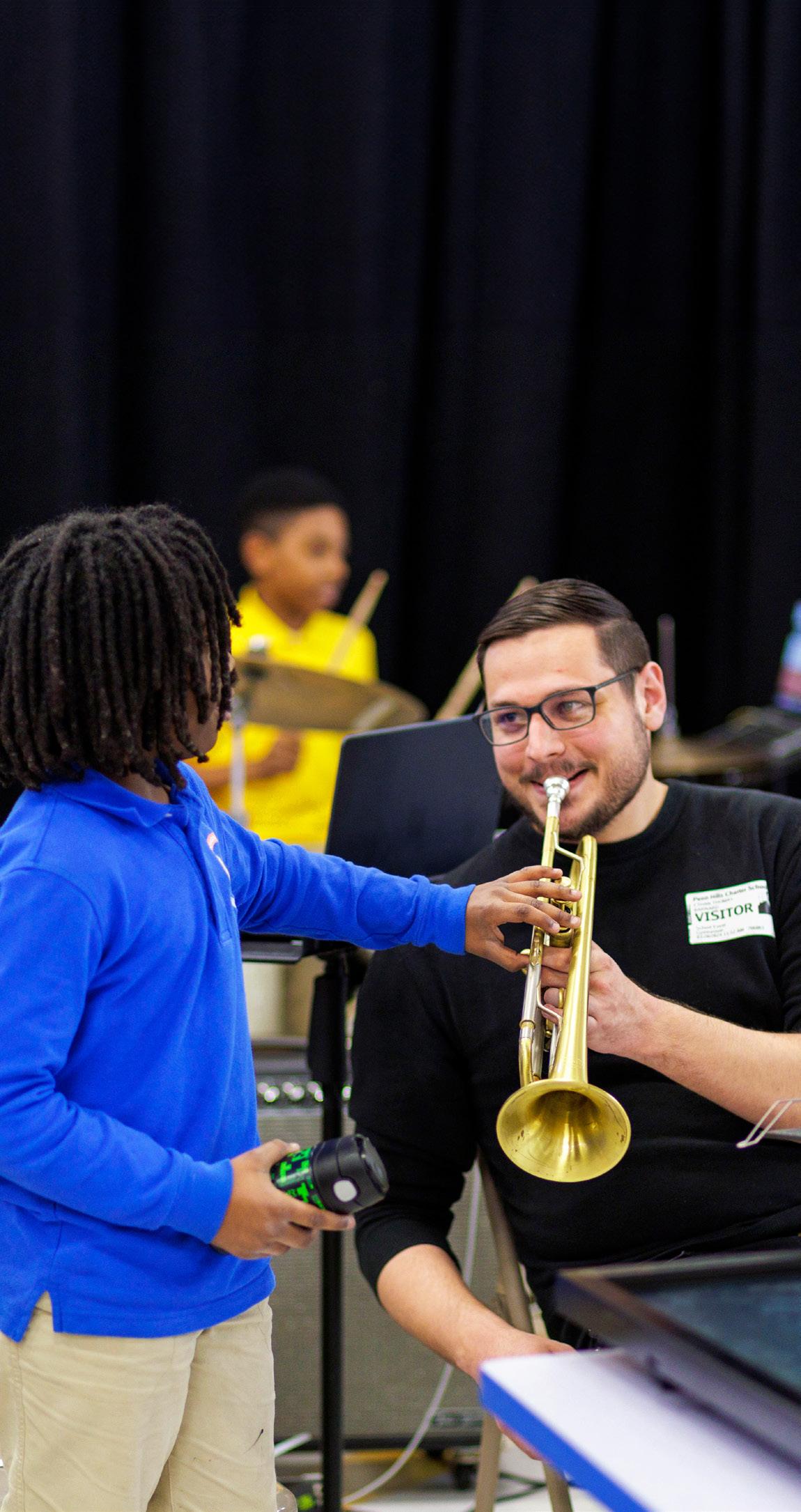
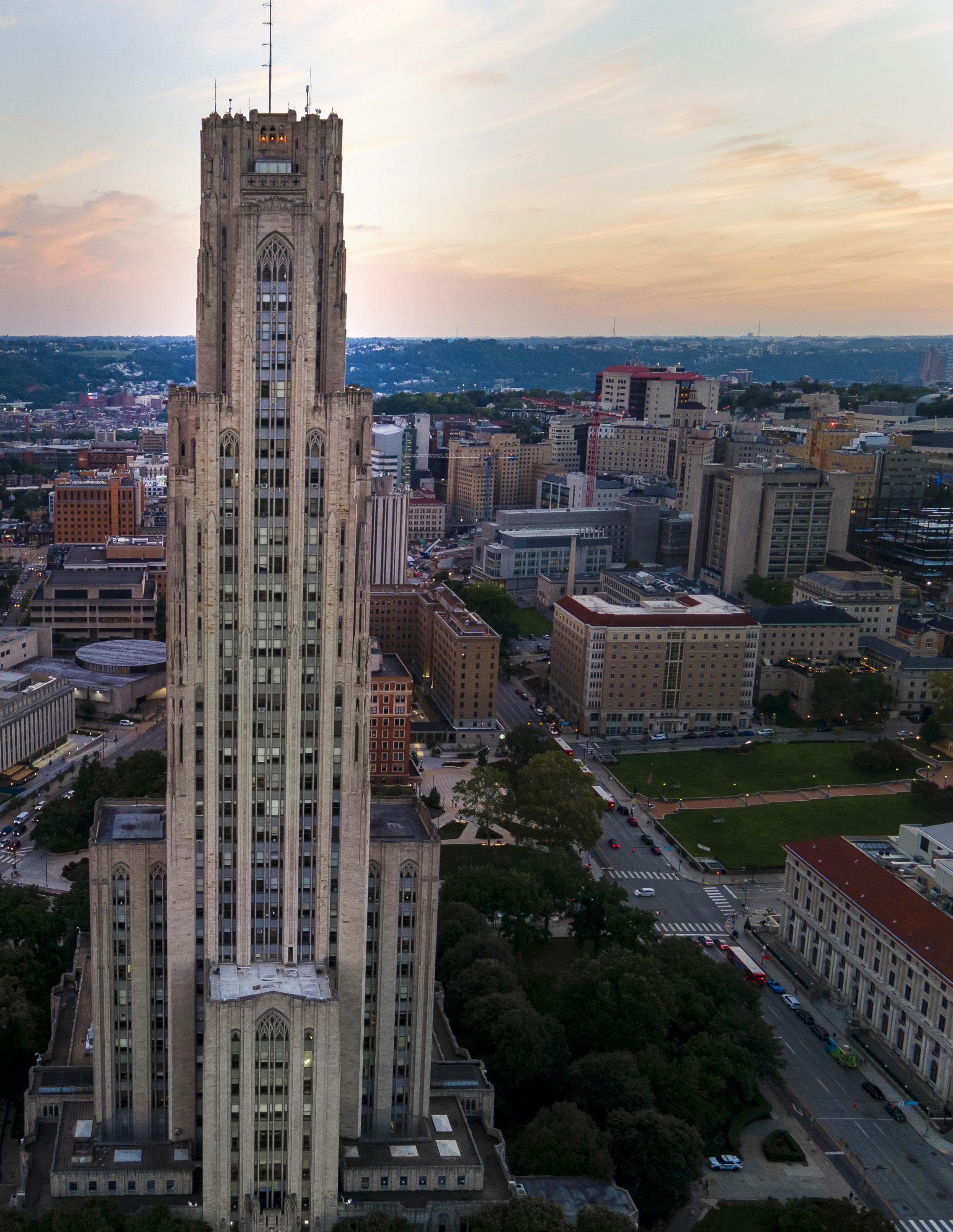
Institute for Entrepreneurial Excellence Fiscal Year 2024 by the Numbers
Clients
Businesses Started clock male money-bill briefcase chart-network layer-group
Consulting Hours
1,452 12,094
Capital 19.13M
Training Events Held 70 48
Jobs Supported/Created
9,822
With the help of SBDC’s Brent Rondon, Bon Tool Co. was able to make an important exporting connection into Mexico and Latin America that not only achieved business success but also led to Bon Tool’s recognition as the 2024 Pennsylvania Exporter of the Year and the 2024 Mid-Atlantic Region Exporter of the Year from the U.S. Small Business Administration.
The Bongiovanni family, owners of Bon Tool, sought to expand Bon Tool’s business operations into Mexico, Central America, and South America. To help with this, Rondon had someone in mind whom he had met by chance during a Spanish mass. Hugo Martinez Lastra and his family had traveled from Mexico to Pittsburgh to seek critical medical care for their son’s rare heart condition. Recognizing Martinez’s background in construction and the tool industry, Rondon believed that he would be an ideal fit for employment with Bon Tool, benefiting both the company and the Martinez family during a challenging time.
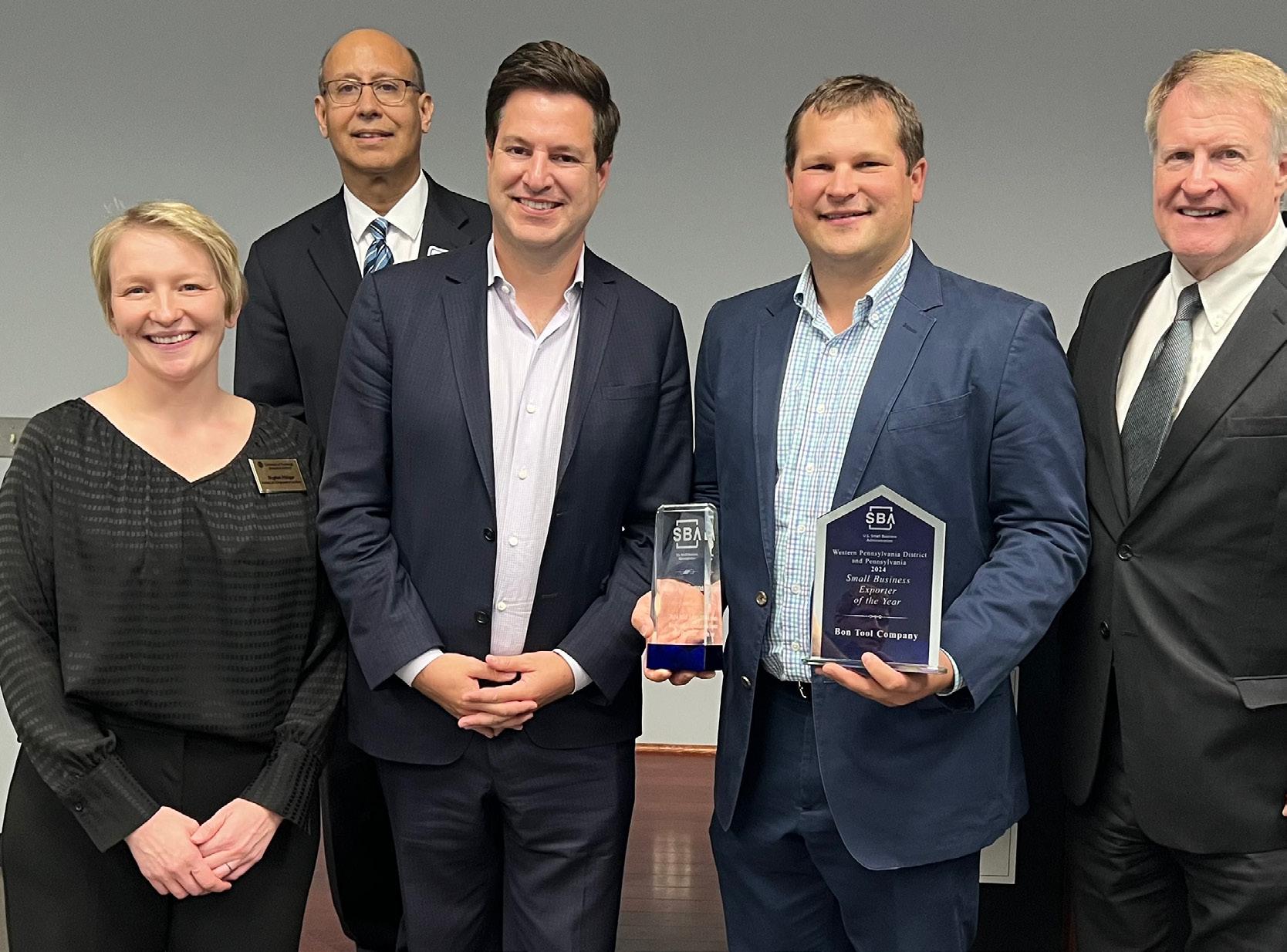
Rondon acted as a translator, connecting Martinez to Carl Bongiovanni and his son, John. The Bongiovannis brought Martinez on board to oversee Latin American marketing and sales. The engagement did not come without its challenges, including visa constraints leading to Martinez’s working as an independent contractor and a subsequent return to Mexico. Bon Tool took steps to sponsor Martinez for a permanent work visa, setting plans to bring him and his family back to Pittsburgh and solidifying his role in the company’s Latin American expansion.
Bon Tool’s success lies in strategic decisions, dedication to fostering relationships, and embracing a global perspective. The story of the Bongiovanni family and Hugo Martinez Lastra reflects the values of the company: navigating the complexities of international business with a pragmatic and compassionate approach. And thanks to Rondon’s help in putting the pieces together throughout the process, that endeavor appears poised to be successful for years to come.
James Wolfe and Lena Laskaris began their entrepreneurial journey in 2017, when they moved from Washington, D.C. to Pittsburgh to start a food business inspired by the Appalachian cooking of Wolfe’s grandmother. With the help of the Pitt SBDC, the couple learned how to register the business in Pennsylvania, develop a business plan, and understand the necessary permits for a mobile food business. With sustained contact with SBDC and after seeing tremendous success and consistent growth at farmer’s markets and fairs, Wise County Biscuits looked to go from pop-up food vendor to brick-and-mortar café.
SBDC assisted Laskaris and Wolfe by reviewing their updated business plan and developing three-year financial projections to support their successful loan application. They opened the doors to Wise County Café in the fall of 2023 to great success, with regular lines of customers out the door and around the block. Laskaris and Wolfe continue to work with SBDC to evaluate business operations, set revenue goals, and strategize for the expansion of their wholesale production.

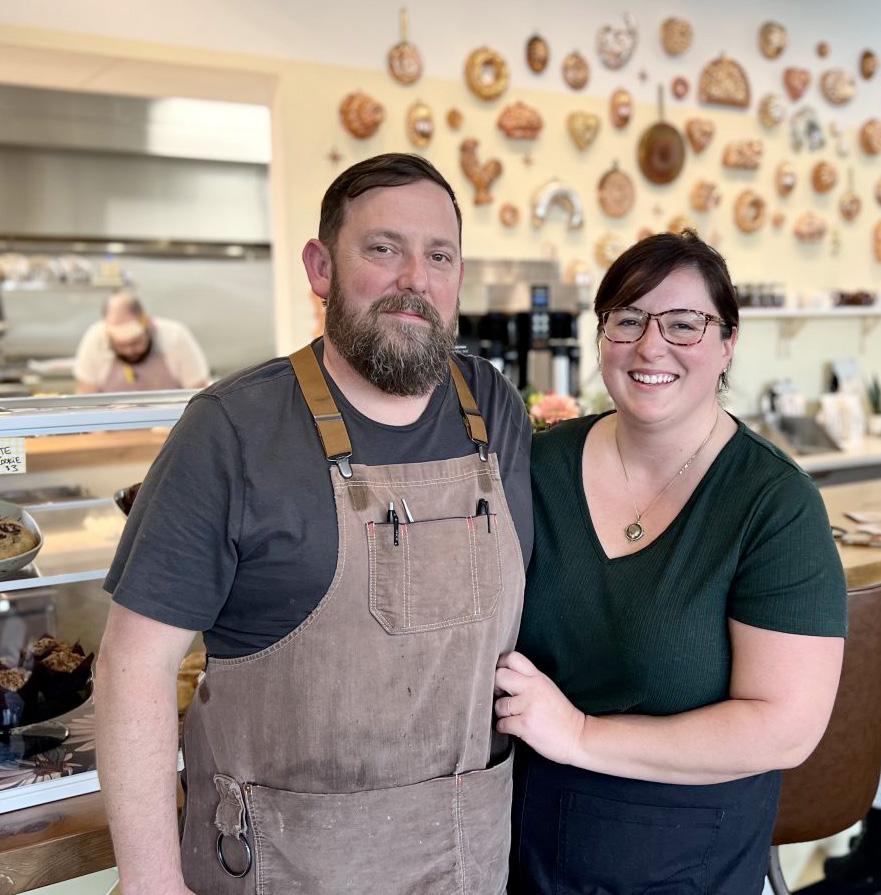
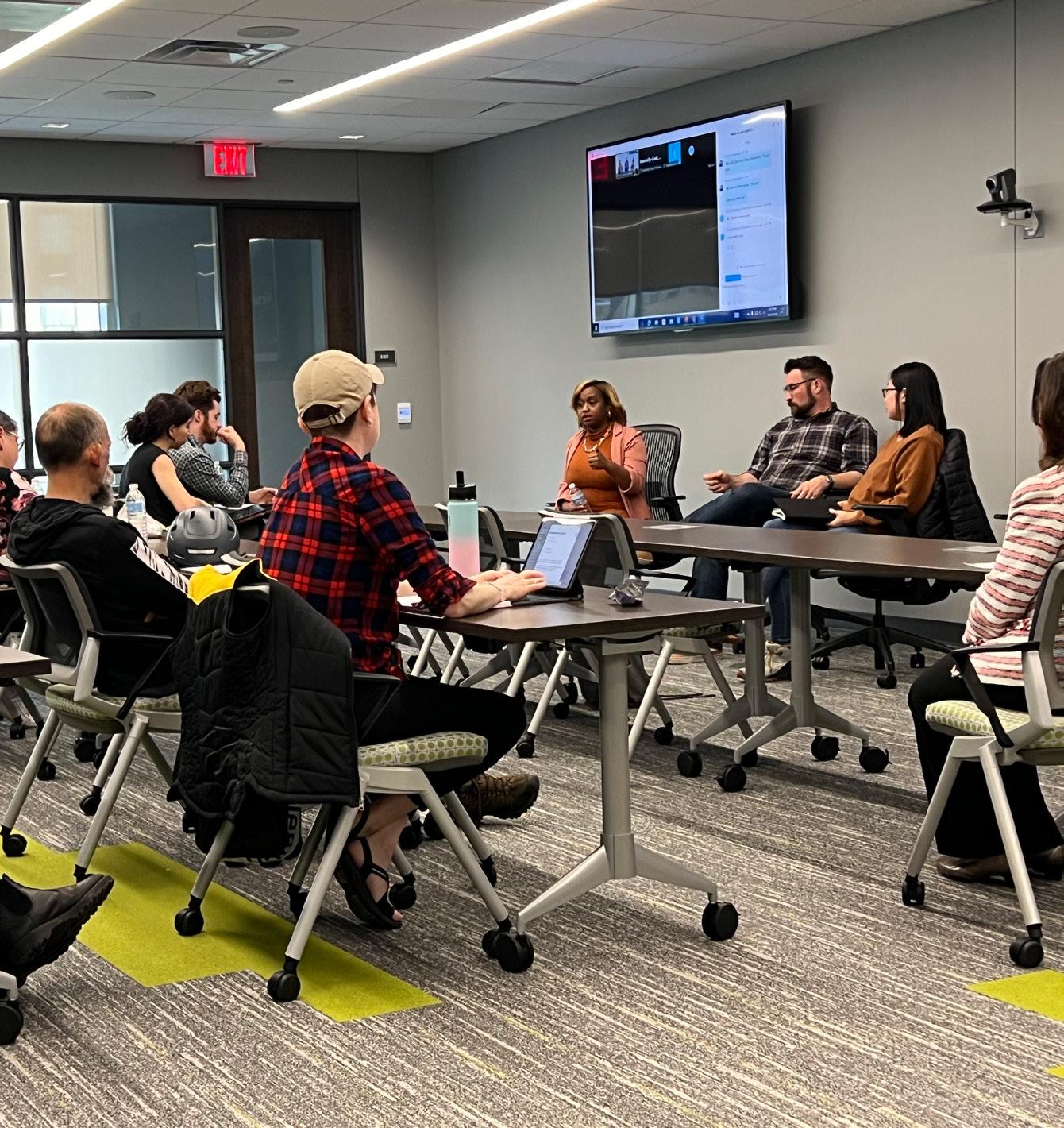
The Institute for Entrepreneurial Excellence’s PantherlabWorks, its center focused on helping entrepreneurs through the development, launch, and commercialization of new products, conducted its first Made to Last series in spring 2024. Made to Last is a no-cost education and network-building series designed to help gig and maker businesses scale and grow. Through six sessions, 85 gig workers and makers learned from panels of successful entrepreneurs who started where they are now. Topics for the series included defining and planning for success, engagement strategies, and scaling for products and people. Following completion of the program, participants could join peer forums for continued progress that are currently under way. Made to Last programming is made possible through a Richard King Mellon Foundation grant that PantherlabWorks was awarded in the fall of 2023.

In December 2023, the Institute for Entrepreneurial Excellence celebrated the graduation of its 25th Entrepreneurial Fellows Class (EFC). The graduation was the culmination of 10 months of educational programming, mentoring, and peer learning opportunities meant to grow the leadership acumen and business operational knowledge of its participants.
The Institute for Entrepreneurial Excellence’s Urban and Community Entrepreneurship Program (UCEP) specializes in helping urban and communitybased businesses to grow through educational workshops, consulting services, and collaborative partnerships, primarily through the center’s flagship program, Community Power to Prosper. Eleven participants graduated from the six-month program in December 2023. In June 2024, nine participants from the Riverside Center for Innovation’s BizFIT Entrepreneurial Cohort Training program culminated their three-tier business education program with training through Community Power to Prosper.
“As business owners, we all at least have some cracks in the foundation … and just the information I was provided over these last several months has really helped me close the gap and fill in some of those cracks.”
Tamara Bey, EGR Financial Solutions
In January 2024, EFC kicked off its 26th cohort with 28 fellows from Western Pennsylvania businesses. EFC is a yearlong tuition-based certificate program for founders, C-suite executives, and rising business leaders designed to build their expertise in managing and growing their businesses.
“I’ve been an educator for my entire career, but I didn’t ever consider myself an entrepreneur. Me pushing myself to be in these spaces is the best thing I got out of this program. The leadership class really stuck out to me. It taught me what a leader looks like as a solo entrepreneur: authenticity and showing up.”
Crystal Rose, Nea Onnim LLC
A growing focus for the Small Business Development Center (SBDC) is expanding vendor/supplier engagement opportunities for diverse suppliers. It is of heightened interest for several large and midsize institutions in our region and is even identified as a key component of Pitt Chancellor Joan Gabel’s Plan for Pitt 2028. This diversification not only strengthens the local economy but also fosters greater equity and sustainability, laying a solid foundation for continued economic development and prosperity for all stakeholders. In addition to recurring programming like the University-focused Doing Business with Pitt and UPMC Essentials for Success for the UPMC system in Pennsylvania, Maryland, New York, New Jersey, and Delaware, SBDC also helped to develop the UPMC Essentials for Success Entrepreneurial Series. The two-part series focuses on skills important to growing as a business not only within the UPMC system but for any vendor/supplier engaged with organizations of all sizes.

SBDC also has hosted exporting events throughout the year, including the recent Advantages of Exporting to Canada and Mexico event with foreign trade representatives from Toronto, Ontario, Canada, and Mexico City, Mexico. Attended by more than 20 trade-focused business representatives, the event was supported by the U.S. Small Business Administration and held at the Southwestern Pennsylvania Commission office. In addition to hosting this type of programming, SBDC’s supply chain activities continue to develop and leverage the strengths of the Institute for Entrepreneurial Excellence’s five centers.
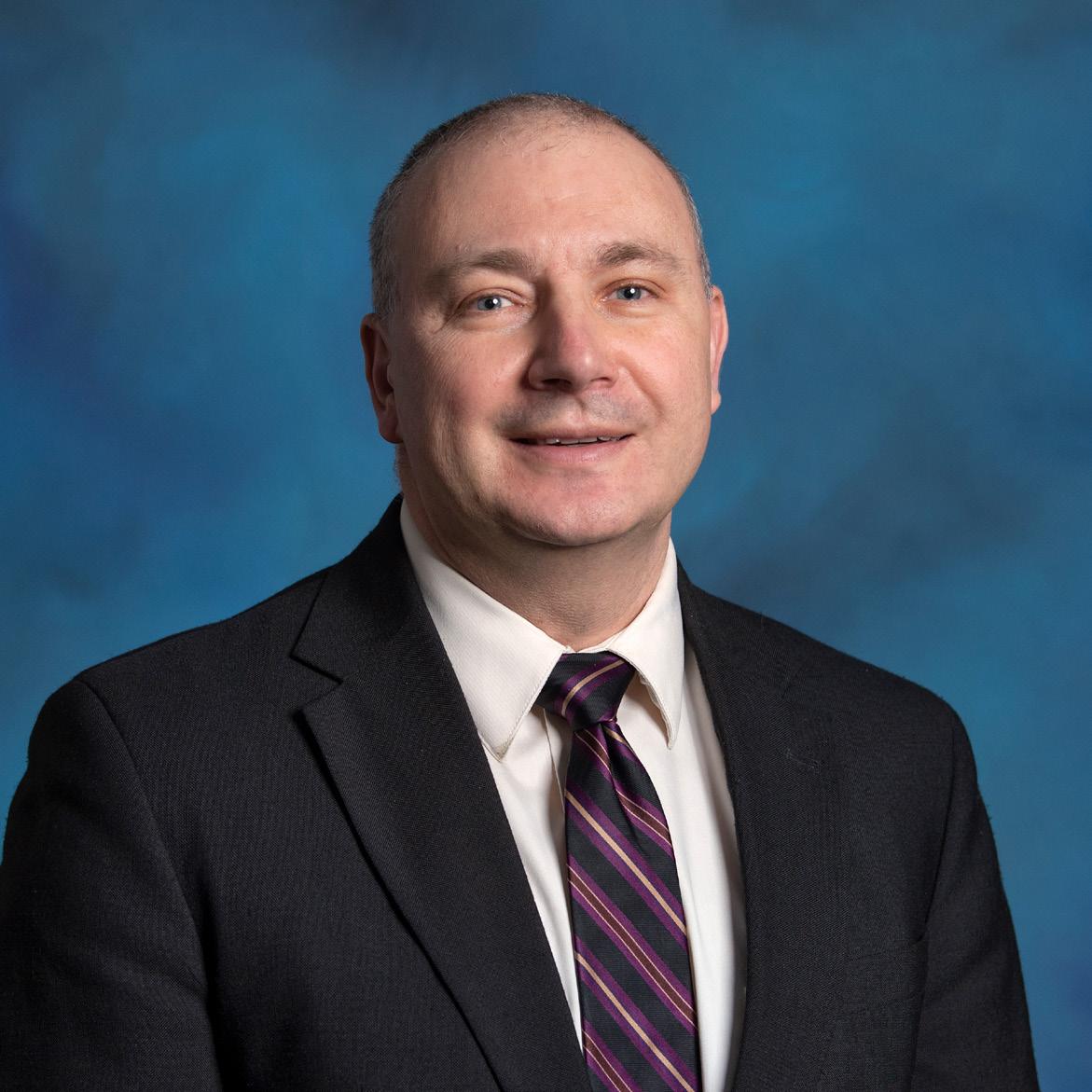
Ray Vargo, longtime director of the Pitt Small Business Development Center and a 29-year employee of the University of Pittsburgh, died in April 2024 at the age of 53. Vargo was a champion and cherished member of the regional small business community. During his tenure, Ray consulted with more than 20,000 businesses and under his leadership the SBDC was named the top small business development center in the nation in 2020 by the U.S. Small Business Administration. Ray’s impact on educating and supporting small business owners will continue for generations to come.



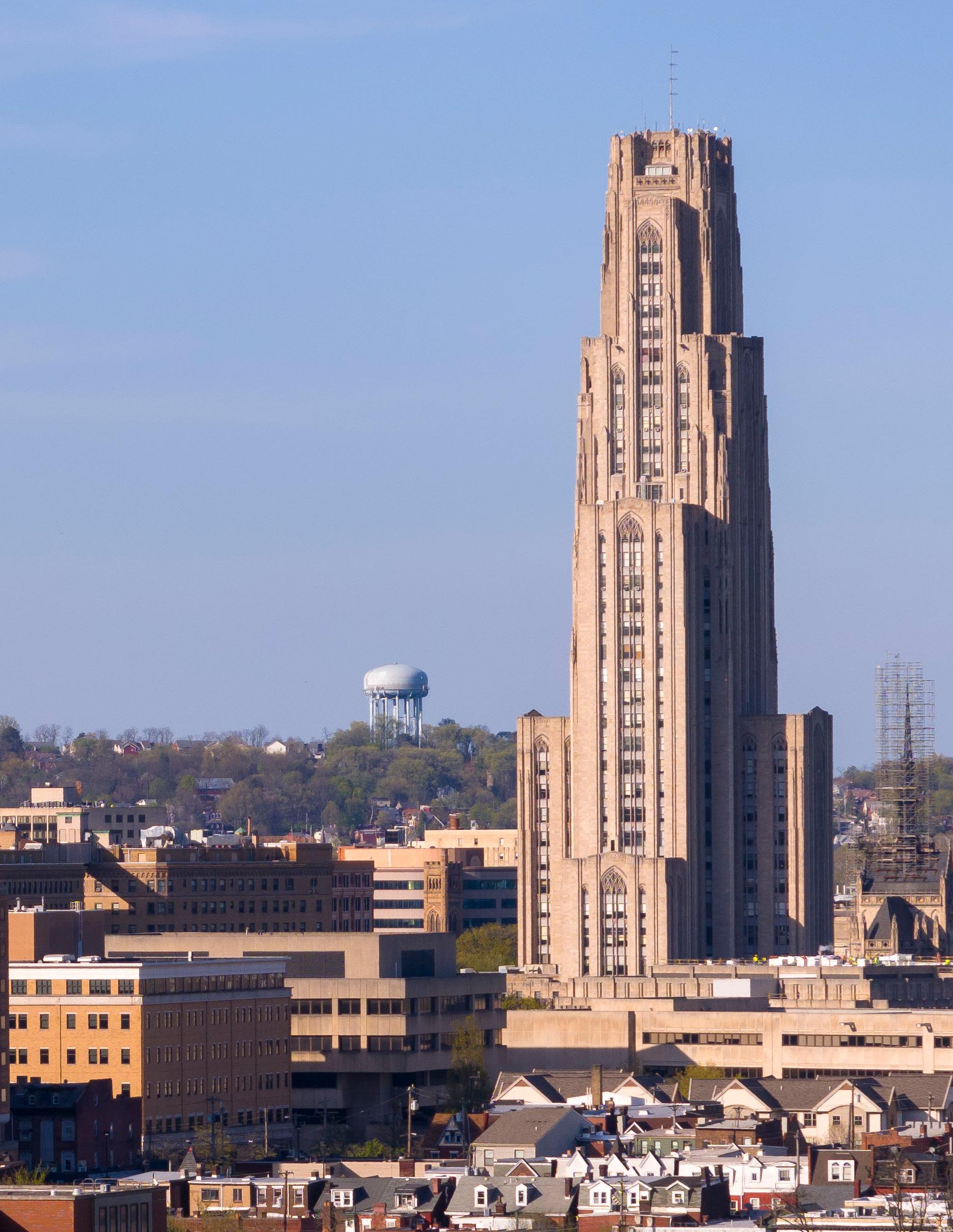
In 2024, Pitt launched its first research and development (R&D) collaboration with bioMérieux, focusing on sequencing efforts. This project brought together bioMérieux’s analytical and sequencing team with Pitt’s Division of Clinical Microbiology and Division of Infectious Diseases, marking the start of a strategic partnership.

“bioMérieux is very proud to start this strategic R&D collaboration with the University of Pittsburgh, especially as it creates a privileged relationship with clinicians in clinical labs, the infectious diseases department, and the ICU department. These interactions are indeed invaluable for shaping future innovative diagnostic solutions for infectious diseases, ultimately contributing to improving patient health”, says Celine Roger-Dalbert, executive vice president for research and development at bioMérieux.
This partnership fully aligns with bioMérieux’s innovation strategy, which aims to build strategic partnerships worldwide, and with Pitt’s mission of fostering translational research through industry collaborations.
“bioMérieux is a worldwide leader in in vitro diagnostics and testing solutions that address the health challenges posed by infectious diseases. Through this strategic collaboration across multiple University labs and departments, University of Pittsburgh researchers and clinicians are excited to work with bioMérieux scientists to confront these challenges and improve patient care by developing innovative diagnostic approaches for numerous infectious diseases,” says Joseph Havrilla, associate vice chancellor for innovation and entrepreneurship at Pitt.
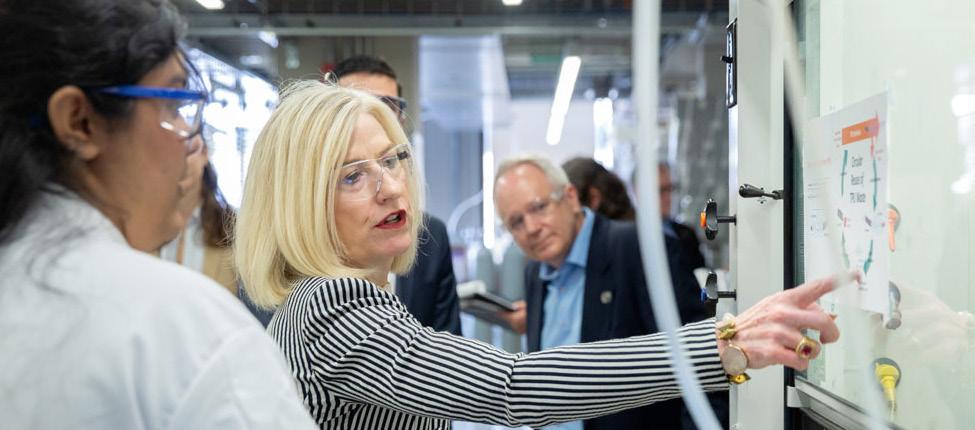
When the partnership between the University of Pittsburgh and The Lubrizol Corporation first formed in 2013, a $1.2 million agreement planted the seed for what would become a commitment to fostering a new future of chemistry and engineering science.
“Over the past decade, our relationship with the University of Pittsburgh Swanson School of Engineering has become a shining example of University-industry partnership,” says Glenn Cormack, Lubrizol process innovation manager and technical fellow. “Our partnership has been instrumental in helping Lubrizol reshape the way we innovate processes, provide more sustainable product solutions, and think about how we decarbonize our manufacturing footprint.”
“Our University of Pittsburgh relationship provides us with a healthy pipeline of talent as well as valuable research and insights that help us progress forward in the markets we serve,” says Rebecca Liebert, president and CEO of Lubrizol.
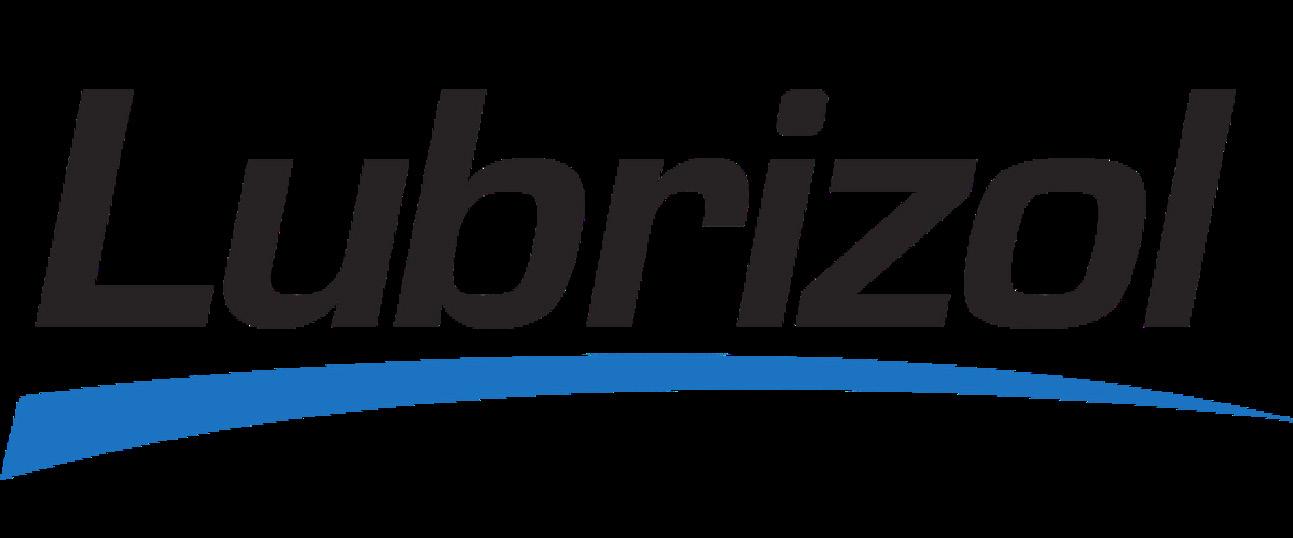
Pitt investigator Götz Veser, a professor of chemical and petroleum engineering in the Swanson School, targeted Lubrizol’s production of additives and dispersants for industry. Veser and his graduate students developed a methodological pathway for process intensification, including a prototype reactor that would later become the genesis of new production skids at Lubrizol.
“The idea of a circular economy is at last gaining momentum in the United States and is encouraging companies like Lubrizol to create a more sustainable approach to manufacturing—one that streamlines processes, reduces waste, and enables a product to find a new life after its initial use,” Veser says. “It’s exciting to work with a company like Lubrizol to bring these ideas to life.”
Pitt was well represented at several important partnering meetings in 2024, including the J.P. Morgan Healthcare Conference and 2024 BIO International Convention, the world’s largest meeting of its kind. At BIO, more than 18,500 industry leaders from more than 5,000 companies gathered for a week of partnership development. The Pitt Office of Industry and Economic Partnerships team held more than 100 partnering meetings, nearly half of them with industry partners who are new to Pitt. Technology licensing was a major focus this year, with more than 350 Pitt technologies represented in key therapeutic areas like gene therapy, oncology, diabetes, and neurodegenerative diseases.

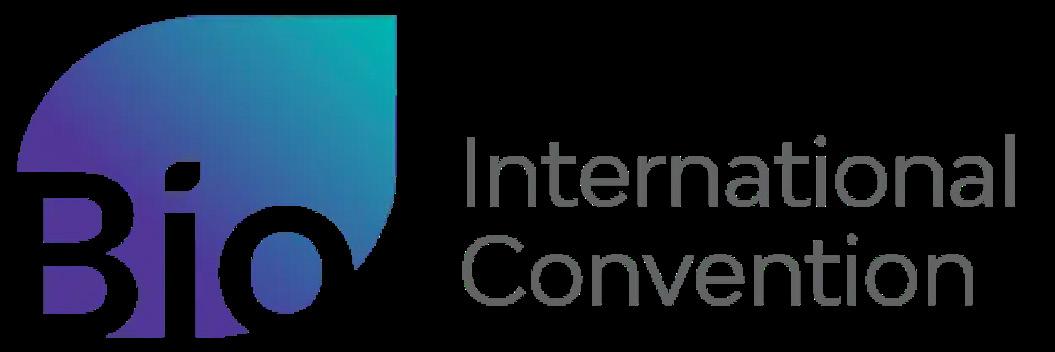
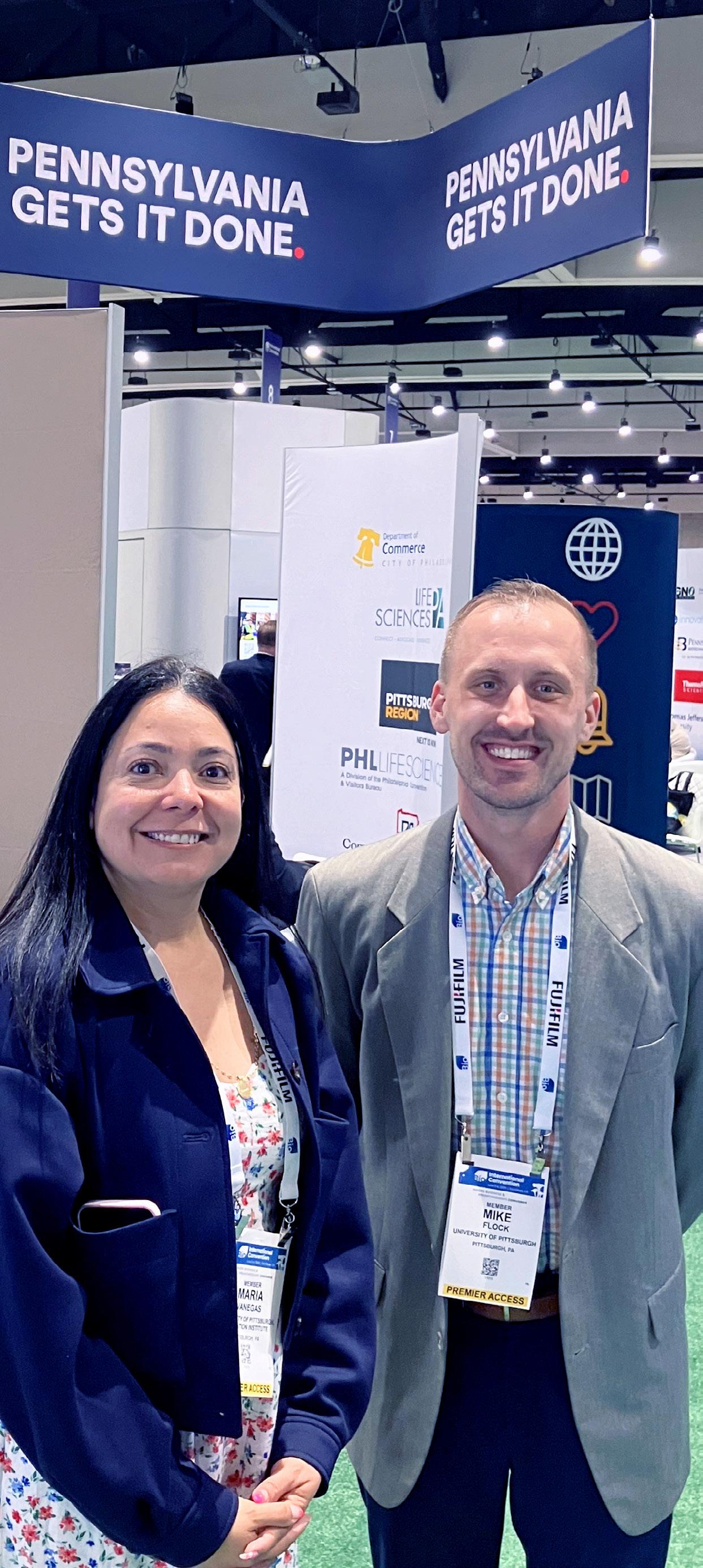
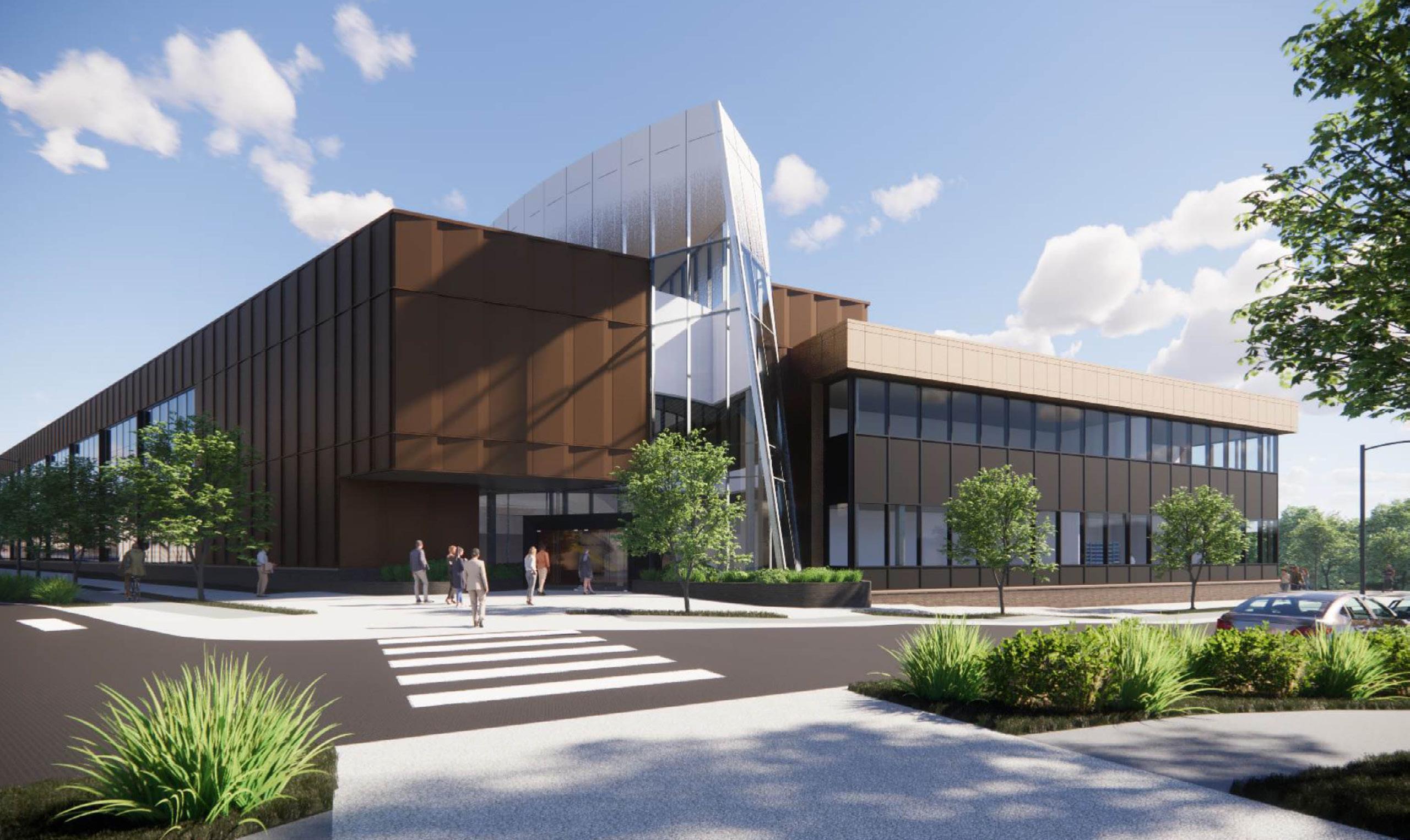
Pitt has partnered with ElevateBio to bring gene therapy manufacturing to Pittsburgh through the creation of BioForge, a cutting-edge biomanufacturing facility. BioForge will specialize in innovative cell and gene therapies, including gene editing, induced pluripotent stem cells, and advanced cell, vector, and protein engineering capabilities.
ElevateBio’s BaseCamp facility in Waltham, Massachusetts, serves as a model for this collaboration, offering state-of-the-art cell and gene therapy manufacturing from concept through commercialization, all within one location.
“The missing ingredient behind all the exceptional emerging research coming out of Pitt was access to high-quality process science and manufacturing capabilities,” says Anantha Shekhar, Pitt’s senior vice chancellor for the health sciences.
“We’ve identified Pittsburgh as an ideal location to extend our Elevate BaseCamp presence as it sits at the intersection of science, technology, and talent,” adds David Hallal, chair and CEO of ElevateBio.
As BioForge positions Pitt as a global hub for life sciences and biotech, construction is set for completion in 2025.